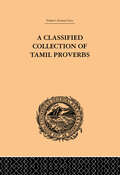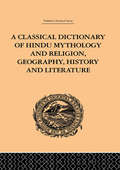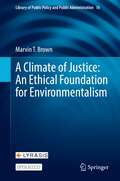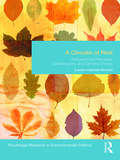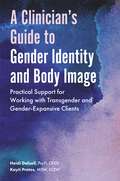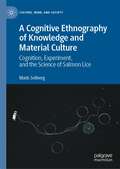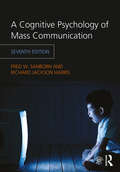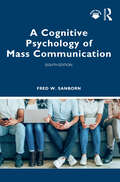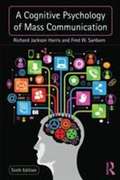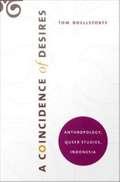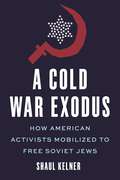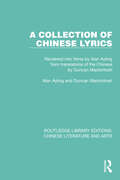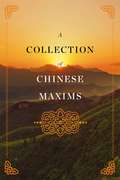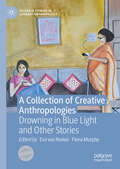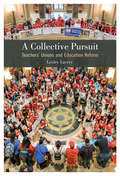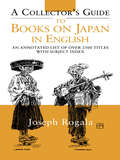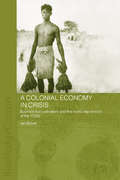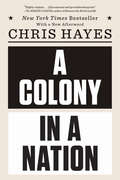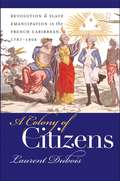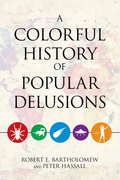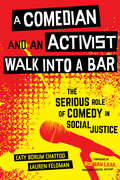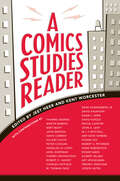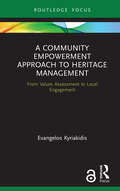- Table View
- List View
A Classical Collection of Tamil Proverbs
by Herman JensenFirst Published in 2000. Routledge is an imprint of Taylor & Francis, an informa company.
A Classical Dictionary of Hindu Mythology and Religion, Geography, History and Literature
by John DowsonThis is Volume VIII in a series of ten on India: Religion and Philosophy. Originally published in 1879, work an endeavour has been made to supply the long-felt want of a Hindu Classical Dictionary. The main portion of this work consists of mythology, but religion is bound up with mythology, and in many points the two are quite inseparable.
A Climate of Justice: An Ethical Foundation for Environmentalism (Library of Public Policy and Public Administration #16)
by Marvin T. BrownThis open access book helps readers combine history, politics, and ethics to address the most pressing problem facing the world today: environmental survival. In A Climate of Justice, Marvin Brown connects the environmental crisis to basic questions of economic, social, and racial justice. Brown shows how our current social climate maintains systemic injustices, and he uncovers resources for change through a civic ethics of repair and reciprocity. A must-read for researchers and educators in the area of environmental ethics and those teaching courses in the fields of public policy and environmental sustainability. With the support of more than 30 libraries, the LYRASIS United Nations Sustainable Development Goals Fund has enabled this publication related to SDG13 (Climate Action) to be available fully open access.
A Climate of Risk: Precautionary Principles, Catastrophes, and Climate Change (Environmental Politics)
by Lauren Hartzell-NicholsWe are living in a climate of risk. Our way of life imposes risks on ourselves and others. We are causing climatic changes that have the potential to change radically the conditions under which both we – the present generation – and future generations will live. While we are now quite certain that climate change is happening, we are unsure of exactly what will happen and when, given different emissions and policy scenarios. We are therefore in a position where we must decide what to do about the risks climate change threatens in the face of a range of uncertainties In this book, Lauren Hartzell-Nichols provides guidance in the face of this uncertainty by offering an in-depth discussion of how and why we ought to take a precautionary approach to climate policy, namely by appeal to a Catastrophic Precautionary Principle and Catastrophic Precautionary Decision-Making Framework. By examining the way in which climate change is harmful, Hartzell-Nichols shows how precaution does have a meaningful role to play in moving climate policy forward if we reconsider what precaution is about before too quickly appealing to precaution as a reason or justification for action. A Climate of Risk takes a philosophically grounded, interdisciplinary approach that will appeal to a broad scholarly and policy-oriented audience. Hartzell-Nichols’s reinterpretation of the precautionary principle enables precaution to be more effectively leveraged as a driver of action on climate change.
A Clinician’s Guide to Gender Identity and Body Image: Practical Support for Working with Transgender and Gender-Expansive Clients
by Heidi Dalzell Kayti ProtosThis accessible guide for clinicians and clinical students working in the fields of eating disorders and transgender health psychology offers useful tips, constructive case studies and reflective questions that enable readers to feel better equipped in supporting their clients' needs.The book addresses the clinical challenges a therapist may encounter, and provides advice on the key issues involved in therapeutic work with transgender, non-binary and gender-expansive clients, including trauma, minority stress, coming out, family support, appearance and body changes. This book will inspire clinicians to bridge the disconnect between the clinical criteria for eating disorders and the type of eating disorder manifesting in a client with co-occurring gender dysphoria.
A Cognitive Ethnography of Knowledge and Material Culture: Cognition, Experiment, and the Science of Salmon Lice (Culture, Mind, and Society)
by Mads SolbergThis cognitive ethnography examines how scientists create meaning about biological phenomena through experimental practices in the laboratory, offering a frontline perspective on how new insights come to life. An exercise in the anthropology of knowledge, this story follows a community of biologists in Western Norway in their quest to build a novel experimental system for research on Lepeoptheirus salmonis, a parasite that has become a major pest in salmon aquaculture. The book offers a window on the making of this material culture of science, and how biological phenomena and their representations are skillfully transformed and made meaningful within a rich cognitive ecology. Conventional accounts of experiments see their purpose as mainly auxiliary, as handmaidens to theory. By looking closely at experimental activities and their materiality, this book shows how experimentation contributes to knowledge production through a broader set of epistemic actions.In drawing on a combination of approaches from anthropology and cognitive science, it offers a unique contribution to the fields of cultural psychology, psychological anthropology, science and technology studies and the philosophy of science.
A Cognitive Psychology of Mass Communication
by Richard Jackson Harris Fred W. SanbornIn a constantly changing media landscape, A Cognitive Psychology of Mass Communication is the go-to text for any course that examines mass communication from a psychological perspective. Now in its seventh edition, the book continues its exploration of how our experiences with media affect the way we acquire and process knowledge about the world and how this knowledge influences our attitudes and behavior. Updates include end-of-chapter suggestions for further reading, new research and examples for a more global perspective, as well as an added emphasis on the power of social media in affecting our perceptions of reality and ourselves. While including real-world examples, the book also integrates psychology and communication theory along with reviews of the most up-to-date research. The text covers a diversity of media forms and issues, ranging from commonly discussed topics such as politics, sex, and violence, to lesser-studied topics, such as emotions and prosocial media. The accompanying companion website also includes resources for both instructors and students For students: Chapter outlines, summaries, and review questions Useful links For instructors: Guidelines for in-class discussions Sample syllabus Readers will be challenged to become more sensitized and to think more deeply about their own media use as they explore research on behavior and media effects. Written in an engaging, readable style, the text is appropriate for graduate or undergraduate audiences.
A Cognitive Psychology of Mass Communication
by Fred W. SanbornThe eighth edition of this text remains an indispensable resource for mass communication psychology and media effects courses. This book gives readers an in-depth understanding of how media affect our attitudes, thinking, and behavior. Continuing its academically rigorous yet student-friendly approach to this subject, the new edition has been thoroughly updated to reflect our current media landscape. Updates include new research and examples for an increasingly global perspective, an increased focus on social media, additional graphics, special end-of-chapter application sections, and an expansion in the list of references to reflect the latest research discussed. The book continues to emphasize the power of media, including social media, in affecting our perceptions of reality. There is also a detailed discussion of misinformation, disinformation, and fake news. Written in an engaging, readable style, the text is appropriate for graduate or undergraduate students in media psychology, mass communication psychology, and media effects courses. Accompanying online resources are also available for both students and instructors. For students: chapter outlines, additional review and discussion questions, useful links, and suggested further reading. For instructors: lecture slides, guidelines for in-class discussions, a sample syllabus, chapter summaries, useful links, and suggested further reading. Please visit www.routledge.com/9780367713553.
A Cognitive Psychology of Mass Communication (Sixth Edition)
by Richard Jackson Harris Fred W. SanbornA Cognitive Psychology of Mass Communicationis the go-to text for any course that adopts a cognitive and psychological approach to the study of mass communication. In its sixth edition, it continues its examination of how our experiences with media affect the way we acquire knowledge about the world, and how this knowledge influences our attitudes and behavior. Using theories from psychology and communication along with reviews of the most up-to-date research, this text covers a diversity of media and media issues ranging from commonly discussed topics, such as politics, sex, and violence, to lesser-studied topics, such as sports, music, emotion, and prosocial media. This sixth edition offers chapter outlines and recommended readings lists to further assist readability and accessibility of concepts, and a new companion website that includes recommended readings, even more real-world examples and activities, PowerPoint presentations, sample syllabi, and an instructor guide.
A Coincidence of Desires: Anthropology, Queer Studies, Indonesia
by Tom BoellstorffIn A Coincidence of Desires, Tom Boellstorff considers how interdisciplinary collaboration between anthropology and queer studies might enrich both fields. For more than a decade he has visited Indonesia, both as an anthropologist exploring gender and sexuality and as an activist involved in HIV prevention work. Drawing on these experiences, he provides several in-depth case studies, primarily concerning the lives of Indonesian men who term themselves gay (an Indonesian-language word that overlaps with, but does not correspond exactly to, the English word "gay"). These case studies put interdisciplinary research approaches into practice. They are preceded and followed by theoretical meditations on the most productive forms that collaborations between queer studies and anthropology might take. Boellstorff uses theories of time to ask how a model of "coincidence" might open up new possibilities for cooperation between the two disciplines. He also juxtaposes his own work with other scholars' studies of Indonesia, Thailand, the Philippines, Malaysia, and Singapore to compare queer sexualities across Southeast Asia. In doing so, he asks how comparison might be understood as a queer project and how queerness might be understood as comparative. The case studies contained in A Coincidence of Desires speak to questions about the relation of sexualities to nationalism, religion, and globalization. They include an examination of zines published by gay Indonesians; an analysis of bahasa gay--a slang spoken by gay Indonesians that is increasingly appropriated in Indonesian popular culture; and an exploration of the place of warias (roughly, "male-to-female transvestites") within Indonesian society. Boellstorff also considers the tension between Islam and sexuality in gay Indonesians' lives and a series of incidents in which groups of men, identified with Islamic fundamentalism, violently attacked gatherings of gay men. Collectively, these studies insist on the primacy of empirical investigation to any queer studies project that wishes to speak to the specificities of lived experience.
A Cold War Exodus: How American Activists Mobilized to Free Soviet Jews
by Shaul KelnerWinner of The 74th National Jewish Book Award: American Jewish Studies Celebrate 350 AwardReveals the mass mobilization tactics that helped free Soviet Jews and reshaped the Jewish American experience from the Johnson era through the Reagan–Bush yearsWhat do these things have in common? Ingrid Bergman, Passover matzoh, Banana Republic®, the fitness craze, the Philadelphia Flyers, B-grade spy movies, and ten thousand Bar and Bat Mitzvah sermons? Nothing, except that social movement activists enlisted them all into the most effective human rights campaign of the Cold War.The plight of Jews in the USSR was marked by systemic antisemitism, a problem largely ignored by Western policymakers trying to improve relations with the Soviets. In the face of governmental apathy, activists in the United States hatched a bold plan: unite Jewish Americans to demand that Washington exert pressure on Moscow for change.A Cold War Exodus delves into the gripping narrative of how these men and women, through ingenuity and determination, devised mass mobilization tactics during a three-decade-long campaign to liberate Soviet Jews—an endeavor that would ultimately lead to one of the most significant mass emigrations in Jewish history.Drawing from a wealth of archival sources including the travelogues of thousands of American tourists who smuggled aid to Russian Jews, Shaul Kelner offers a compelling tale of activism and its profound impact, revealing how a seemingly disparate array of elements could be woven together to forge a movement and achieve the seemingly impossible. It is a testament to the power of unity, creativity, and the unwavering dedication of those who believe in the cause of human rights.
A Collection of Chinese Lyrics: Rendered into Verse by Alan Ayling from translations of the Chinese by Duncan Mackintosh (Routledge Library Editions: Chinese Literature and Arts #9)
by Alan Ayling Duncan MackintoshThis book, first published in 1965, covers a period of one thousand years and collects together some of the best examples of Chinese Lyrics (tz’u). The authors reflect in translation not only the spirit of the original, but also something of its poetical ornamentations and lyric pattern. The Chinese original of each poem faces the English and is written in a Chinese scholar’s distinguished calligraphy. A ‘Note on the Development of the Chinese Lyric’ and several Appendices provide the reader with brief but illuminating social, cultural and historical background.
A Collection of Chinese Maxims
by Yin Haibo Yin BangyanA beautiful collection of Chinese maxims now available in both the original Chinese and in English translation. They cover such diverse topics as government, learning, cultivation of character, affections, and ways of the world. Short and epigrammatic, these maxims are rich of the spirit and culture of China.
A Collection of Creative Anthropologies: Drowning in Blue Light and Other Stories (Palgrave Studies in Literary Anthropology)
by Fiona Murphy Eva Van RoekelA Collection of Creative Anthropologies brings together a series of creative work of anthropologists who share the art of writing that arises from ‘ordinary’ engagement and reveals its potential for the reimagining of anthropological futures and alternative worlds. This is a collection of creative anthropology anchored in experimentality and encouragement. A book that defies imaginaries of academic convention through the cultivation of a mundus imaginalis requiring moments of pause, of introspection, and of discomfort. This centring of creativity at the heart of anthropology subtly conveys how the complex ethical and moral issues around fieldwork and anthropological theorising can be reflected on through writing otherwise, in creative spaces such as this book. A Collection of Creative Anthropologies fits the current call for radical revisions of the academic canon in anthropology, and the social sciences and humanities more broadly.
A Collective Pursuit: Teachers' Unions and Education Reform
by Lesley LaveryTeachers’ unions are the organizations responsible for safeguarding the conditions of teachers’ employment. Union supporters claim strong synergies between teachers’ interests and students’ interests, but critics of unions insist that the stance of teachers in collective bargaining may disadvantage students as unions reduce the power of administrators to manage, remove, reward or retain excellent teachers. In A Collective Pursuit, Lesley Laveryunpacks how teachers’ unions today are fighting for contracts that allow them to earn a decent living and build “schools all students deserve.” She explains the form and function of the nation’s largest teachers’ unions. Lavery then explores unionization campaigns in the Twin Cities charter schools. A Collective Pursuit also examines teacher strikes and contract negotiations, school finance and finance reform, and district and union attempts to address racial achievement gaps, to provide a context for understanding the economic, political, and demographic forces that inspire teachers to improve conditions for students. A Collective Pursuit emphasizes that while teachers’ unions serve a traditional, economic role, they also provide a vast array of valuable services to students, educators, parents, and community members.
A Collector's Guide to Books on Japan in English: An Annotated List of Over 2500 Titles with Subject Index (Japan Library)
by Jozef RogalaProvides an invaluable and very accessible addition to existing biographic sources and references, not least because of the supporting biographies of major writers and the historical and cultural notes provided.
A Colonial Economy in Crisis: Burma's Rice Cultivators and the World Depression of the 1930s (Routledge Studies in the Modern History of Asia #Vol. 28)
by Ian BrownThe book challenges the orthodox argument that rural populations which abandoned self-sufficiency to become single commodity producers, and were supposedly very vulnerable to the commodity price collapse of the 1930s Depression, did not suffer as much as has been supposed. It shows how the effects of the depression were complicated, varying between regions, between different kinds of economic actors, and over time, and shows how the 'victims' of the depression were not passive, working imaginatively to mitigate their circumstances.
A Colonial Plantation Cookbook: The Receipt Book of Harriott Pinckney Horry, 1770
by Richard J. Hooker“A charming compilation of eighteenth-century recipes . . . a well-researched account of Mrs. Horry’s fascinating life-style.” —The North Carolina Historical ReviewHarriott Pinckney Horry began her receipt book more than two hundred years ago. It is being published now for the first time.You will get a lively sense of what colonial plantation life was like from reading Harriott’s receipt book. She began it in 1770, shortly after she was married, writing recipes and household information in a notebook. Her recipes reflect both English and French culinary traditions. You will recognize in the recipes the origins of some of your contemporary favorites.Harriott writes also about keeping the dairy and smokehouse, how to dye clothes, what to do about insects, how to care for trees and crops, and how to make soap, all skills she learned in the course of managing the plantation after her husband’s early death.From Harriott’s writing and Hooker’s knowledgeable introduction and editorial notes, you will learn what it was like to be well-to-do and a member of Southern aristocracy, living in a world of rice and indigo planters, merchants, lawyers, and politicians—the colonial elite. Because knowing about food preferences and eating habits of any people expands our understanding of their nature and times, the receipt book of Harriott Pinckney Horry opens another window on the history of colonial plantations.“Gives us a very good idea of the household’s prize dishes.” —The Washington Post“Cookbook collectors will love it and even readers who don’t enter the kitchen will find it entertaining.” —The Charleston Evening Post
A Colony in a Nation
by Chris Hayes<P>New York Times best-selling author and Emmy Award–winning news anchor Chris Hayes argues that there are really two Americas: a Colony and a Nation. <P>America likes to tell itself that it inhabits a postracial world, yet nearly every empirical measure—wealth, unemployment, incarceration, school segregation—reveals that racial inequality has barely improved since 1968, when Richard Nixon became our first “law and order” president. With the clarity and originality that distinguished his prescient bestseller, Twilight of the Elites, Chris Hayes upends our national conversation on policing and democracy in a book of wide-ranging historical, social, and political analysis. <P>Hayes contends our country has fractured in two: the Colony and the Nation. In the Nation, we venerate the law. In the Colony, we obsess over order, fear trumps civil rights, and aggressive policing resembles occupation. A Colony in a Nation explains how a country founded on justice now looks like something uncomfortably close to a police state. How and why did Americans build a system where conditions in Ferguson and West Baltimore mirror those that sparked the American Revolution? <P>A Colony in a Nation examines the surge in crime that began in the 1960s and peaked in the 1990s, and the unprecedented decline that followed. Drawing on close-hand reporting at flashpoints of racial conflict, as well as deeply personal experiences with policing, Hayes explores cultural touchstones, from the influential “broken windows” theory to the “squeegee men” of late-1980s Manhattan, to show how fear causes us to make dangerous and unfortunate choices, both in our society and at the personal level. With great empathy, he seeks to understand the challenges of policing communities haunted by the omnipresent threat of guns. Most important, he shows that a more democratic and sympathetic justice system already exists—in a place we least suspect. <P>A Colony in a Nation is an essential book—searing and insightful—that will reframe our thinking about law and order in the years to come. <P><b>A New York Times Bestseller</b>
A Colony of Citizens: Revolution & Slave Emancipation in the French Caribbean, 1787-1804
by Laurent Dubois<P>The idea of universal rights is often understood as the product of Europe, but as Laurent Dubois demonstrates, it was profoundly shaped by the struggle over slavery and citizenship in the French Caribbean. Dubois examines this Caribbean revolution by focusing on Guadeloupe, where, in the early 1790s, insurgents on the island fought for equality and freedom and formed alliances with besieged Republicans. <P> In 1794, slavery was abolished throughout the French Empire, ushering in a new colonial order in which all people, regardless of race, were entitled to the same rights. But French administrators on the island combined emancipation with new forms of coercion and racial exclusion, even as newly freed slaves struggled for a fuller freedom. In 1802, the experiment in emancipation was reversed and slavery was brutally reestablished, though rebels in Saint-Domingue avoided the same fate by defeating the French and creating an independent Haiti. The political culture of republicanism, Dubois argues, was transformed through this transcultural and transatlantic struggle for liberty and citizenship. The slaves-turned-citizens of the French Caribbean expanded the political possibilities of the Enlightenment by giving new and radical content to the idea of universal rights.
A Colorful History of Popular Delusions
by Robert E. Bartholomew Peter HassallThis eclectic history of unusual crowd behavior describes a rich assortment of mass phenomena ranging from the amusing and quirky to the shocking and deplorable. What do fads, crazes, manias, urban legends, moral panics, riots, stampedes, and other mass expressions of emotion have in common? By creating a typology of such behavior, past and present, the authors show how common extraordinary group reactions to fear or excitement are. And they offer insights into how these sometimes dangerous mob responses can be avoided. We may not be surprised to read about the peculiarities of the European Middle Ages, when superstition was commonplace: like the meowing nuns of France, "tarantism" (a dancing mania) in Italy, or the malicious anti-Semitic poison-well scares. But similar phenomena show up in our own era. Examples include the social-networking hysteria of 2012, which resulted in uncontrollable twitching by teenage girls in Leroy, NY; the "phantom bus terrorist" of 2004 in Vancouver, Canada; and the itching outbreak of 2000 in South Africa. Vivid, detailed, and thoroughly researched, this is a fascinating overview of collective human behavior in its many unusual forms.From the Trade Paperback edition.
A Comedian and an Activist Walk into a Bar: The Serious Role of Comedy in Social Justice (Communication for Social Justice Activism #1)
by Lauren Feldman Caty Borum ChattooComedy is a powerful contemporary source of influence and information. In the still-evolving digital era, the opportunity to consume and share comedy has never been as available. And yet, despite its vast cultural imprint, comedy is a little-understood vehicle for serious public engagement in urgent social justice issues – even though humor offers frames of hope and optimism that can encourage participation in social problems. Moreover, in the midst of a merger of entertainment and news in the contemporary information ecology, and a decline in perceptions of trust in government and traditional media institutions, comedy may be a unique force for change in pressing social justice challenges. Comedians who say something serious about the world while they make us laugh are capable of mobilizing the masses, focusing a critical lens on injustices, and injecting hope and optimism into seemingly hopeless problems. By combining communication and social justice frameworks with contemporary comedy examples, authors Caty Borum Chattoo and Lauren Feldman show us how comedy can help to serve as a vehicle of change. Through rich case studies, audience research, and interviews with comedians and social justice leaders and strategists, A Comedian and an Activist Walk Into a Bar: The Serious Role of Comedy in Social Justice explains how comedy – both in the entertainment marketplace and as cultural strategy – can engage audiences with issues such as global poverty, climate change, immigration, and sexual assault, and how activists work with comedy to reach and empower publics in the networked, participatory digital media age.
A Comics Studies Reader
by Jeet HeerContributions by Thomas Andrae, Martin Barker, Bart Beaty, John Benson, David Carrier, Hillary Chute, Peter Coogan, Annalisa Di Liddo, Ariel Dorfman, Thierry Groensteen, Robert C. Harvey, Charles Hatfield, M. Thomas Inge, Gene Kannenberg Jr., David Kasakove, Adam L. Kern, David Kunzle, Pascal Lefèvre, John A. Lent, W. J. T. Mitchell, Amy Kiste Nyberg, Fusami Ogi, Robert S. Petersen, Anne Rubenstein, Roger Sabin, Gilbert Seldes, Art Spiegelman, Fredric Wertham, and Joseph WitekA Comics Studies Reader offers the best of the new comics scholarship in nearly thirty essays on a wide variety of such comics forms as gag cartoons, editorial cartoons, comic strips, comic books, manga, and graphic novels.The anthology covers the pioneering work of Rodolphe Töpffer, the Disney comics of Carl Barks, and the graphic novels of Art Spiegelman and Chris Ware, as well as Peanuts, romance comics, and superheroes. It explores the stylistic achievements of manga, the international anti-comics campaign, and power and class in Mexican comic books and English illustrated stories.A Comics Studies Reader introduces readers to the major debates and points of reference that continue to shape the field. It will interest anyone who wants to delve deeper into the world of comics and is ideal for classroom use.
A Community Cares and Shares (Into Reading, Level T #21)
by Diana NoonanNIMAC-sourced textbook. Who is in your community? A community is a group of people who live in the same area or have something in common. People in a community work together to make everyone feel safe and welcome!
A Community Empowerment Approach to Heritage Management (Open Access): From Values Assessment to Local Engagement
by Evangelos KyriakidisThis book presents an innovative approach to public archaeology in a rural community, which has had powerful results in terms of empowering a village community in Crete to become long-term guardians of their cultural heritage. Highlighting the theoretical and local contexts of the Philioremos Peak Sanctuary Public Archeology Project, this book explores the methodology and the project outcomes, and assesses best practice in the field of public archaeology within a rural community. As well as expanding the research on Minoan peak sanctuaries, the volume contributes to a greater understanding of how rural communities can be successfully engaged in the management of heritage, and is relevant to archaeologists and other heritage professionals wishing to understand the latest developments in public archaeology.
